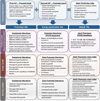Effect of maternal PCOS and PCOS-like phenotype on the offspring's health
- PMID: 26639019
- PMCID: PMC4884168
- DOI: 10.1016/j.mce.2015.11.030
Effect of maternal PCOS and PCOS-like phenotype on the offspring's health
Abstract
Polycystic ovary syndrome (PCOS) is a heterogeneous endocrine disorder with both reproductive and metabolic abnormalities affecting women of reproductive age. While the exact origin of PCOS is unknown, observations from clinical and animal studies suggest that maternal hyperandrogenism may be a contributing factor. Because women with PCOS manifest hyperandrogenism during pregnancy, changes in the gestational endocrine milieu may play a role in the vertical transmission of this syndrome. This review discusses the potential developmental origins of PCOS, the impact of maternal PCOS on the offspring's health and contributions of the postnatal environment, capitalizing on findings from animal models that exhibit a PCOS-like phenotype. In addition, this review highlights the scarcity of data at early gestational stages in humans and the importance of animal experimentation to better understand the cellular and molecular mechanisms involved in the programming of adult diseases, therefore, helping identify therapeutic targets for preventive and treatment strategies.
Keywords: Androgen; Animal models; Developmental programming; Insulin; Polycystic ovary syndrome.
Copyright © 2015 Elsevier Ireland Ltd. All rights reserved.
Figures


References
-
- Abbott DH, Dumesic DA, Eisner JR, Colman RJ, Kemnitz JW. Insights into the development of polycystic ovary syndrome (PCOS) from studies of prenatally androgenized female rhesus monkeys. Trends Endocrinol Metab. 1998;9:62–67. - PubMed
-
- Abbott D, Barnett D, Bruns C, Dumesic D. Androgen excess fetal programming of female reproduction: a developmental aetiology for polycystic ovary syndrome? Human Reproduction Update. 2005;11:357–374. - PubMed
Publication types
MeSH terms
Grants and funding
LinkOut - more resources
Full Text Sources
Other Literature Sources
Medical

